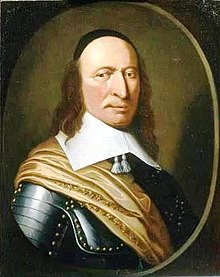Pieter Stuyvesant
| Peter Stuyvesant | |
|---|---|

Painting attributed to Hendrick Couturier c. 1660
|
|
| 7th Director-General of New Amsterdam | |
|
In office 1647–1664 |
|
| Preceded by | Willem Kieft |
| Succeeded by | Office abolished |
| Personal details | |
| Born | 1610 Peperga, Friesland, Netherlands |
| Died | August 1672 (aged c. 62) Manhattan, Province of New York |
| Spouse(s) | Judith Bayard (m. 1645; his death 1672) |
| Children | Balthasar Lazarus Stuyvesant Nicolaes Willem Stuyvesant |
| Parents | Balthazar Jansz Stuyvesant Margaretha Hardenstein |
| Signature |  |
Peter Stuyvesant (English pronunciation /ˈstaɪv.ə.sənt/; in Dutch also Pieter and Petrus Stuyvesant; (1610–1672) served as the last Dutch director-general of the colony of New Netherland from 1647 until it was ceded provisionally to the English in 1664, after which it was renamed New York. He was a major figure in the early history of New York City and his name has been given to various landmarks and points of interest throughout the city (e.g. Stuyvesant High School, Stuyvesant Town–Peter Cooper Village, Stuyvesant Plaza, Bedford–Stuyvesant neighborhood, etc.).
Stuyvesant's accomplishments as director-general included a great expansion for the settlement of New Amsterdam beyond the southern tip of Manhattan. Among the projects built by Stuyvesant's administration were the protective wall on Wall Street, the canal that became Broad Street, and Broadway. Stuyvesant, himself a member of the Dutch Reformed Church, opposed religious pluralism and came into conflict with Lutherans, Jews, Roman Catholics and Quakers as they attempted to build places of worship in the city and practice their faiths.
Stuyvesant was born in 1610 in Peperga, Friesland, in the Netherlands, to Balthasar Stuyvesant, a minister, and Margaretha Hardenstein. He grew up in Peperga, Scherpenzeel, and Berlikum. He studied languages and philosophy in Franeker.
...
Wikipedia
